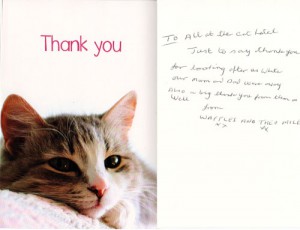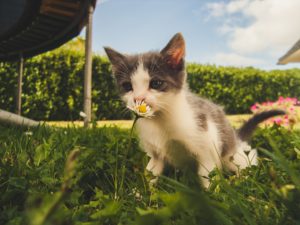Forgiving and patient
Kittens, not unlike our own children, need to be taught how to live in a home. Training a Kitten takes practice and patience. For a kitten to understand what is deemed good or bad, rewards and punishments need to be put in place to reinforce behaviours. You, as the owner, also have a responsibility to provide your pet with the necessary means to carry out desired behaviours. For example; if you don’t want your kitten to defecate in the house, you should provide a litter box.
Setting the right example to your kitten
Kittens do not inherently know how to behave, therefore it’s important to set the right examples and standards as they develop their behavioural skills. Have a spray bottle full of water nearby and spray your cat when he or she displays an undesirable behaviour, for example; scratching anything other than the scratching post.
Don’t declaw your kitten. Healthy kittens need their claws, however, if you are finding your kitten’s claws too sharp, you can ask the vet to cut the tips off. I wouldn’t recommend doing this yourself as kittens have tiny claws and it would be very easy to hurt your pet in an uncontrolled environment. Cats also have a need to scratch things. You can’t train scratching out of them, but you can discourage destructive scratching. You can do this by removing temptation. Cover any furniture your kitten is attractive to and provide an alternative such as a scratching post. Try to incorporate the scratching post into a game so that your cat can become familiar with scratching there.
Kittens also have a tendency to bite while they are teething and playing. While it can be a difficult stage for owners, kittens will feel the need to bite during this time but it will pass. However while in the teething stage you can try to replace hands with toys while playing, or if your kitten gets too rough you can either spray them with a little water or simply walk away. This will show them they won’t get any attention when the game gets out of hand.
While training your kitten to use the litter box, it’s imperative to keep the litter box very clean. The most common reason why kittens stop using litter boxes is due to litter box maintenance. If kittens have been raised with their mother, they will most likely be accustomed to using the litter box already and all you have to do is to re-enforce the habit. You can do this by placing your kitten in the litter box after feeding times, making sure they go to the toilet. You can also help by applying scent that’s attractive for cats if they are having a hard time learning this habit.
Young cats love to jump, and they will jump up onto any and all surfaces. If this isn’t ideal for you it’s important to set boundaries. If your cat jumps up to somewhere you don’t want them to be, for example, a kitchen counter, simply scold them and remove them from the surface. If you repeat this your cat will learn that they are not allowed on that surface. If this bad habit persists, you can add other measures, like the spray bottle because your cat won’t like the feeling and will associate it with being on that surface.







